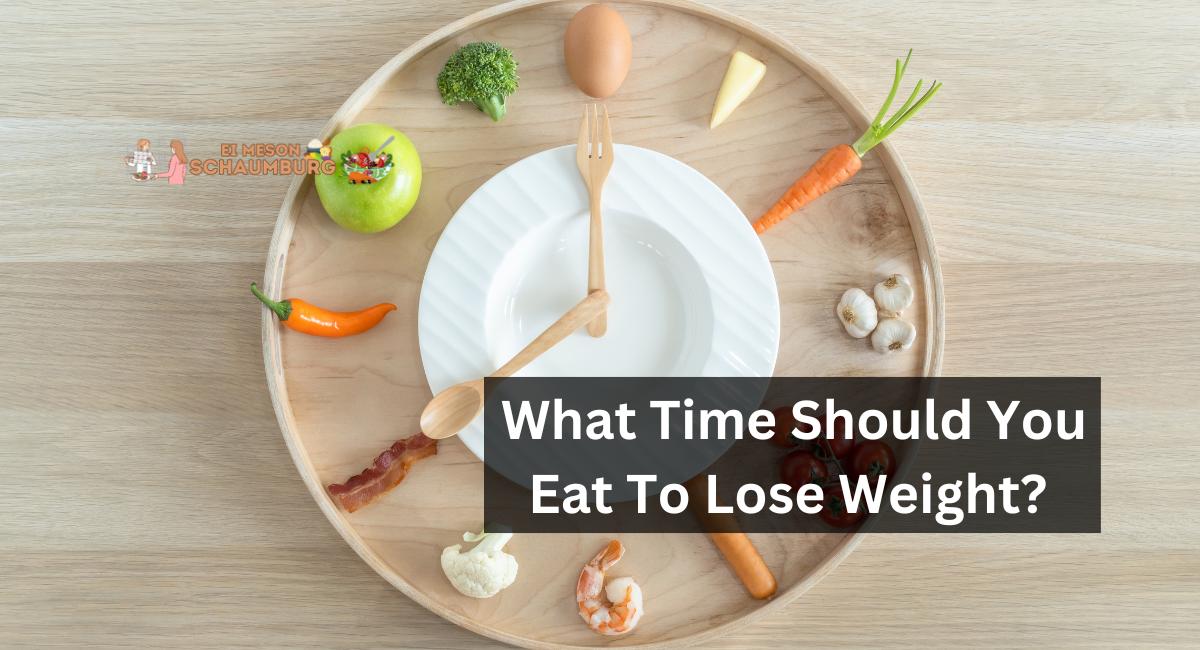There is more to reducing weight than counting calories, which is why many regimens emphasize food quality or macronutrients, such as carbohydrates and proteins. So, what time should you eat to lose weight?
Even though this approach may help some people lose weight, we still need to learn a great deal, particularly regarding the environmental and biological factors that facilitate or impede weight loss efforts.
Meal timing is one of the variables that has recently piqued the interest of researchers. In the past five years, some studies examining weight loss, but with varying foci and methodologies, have yielded similar results: The timing of meals significantly impacts weight loss success.
So, when and how frequently should you consume food to lose weight? There are general recommendations for meal timing, but there are no specific periods for sharing, as these would likely vary by individual.
What Time Should You Eat To Lose Weight?
According to research, dinner is the most effective food for weight loss, followed by breakfast, which is somewhat more controversial. Here are some lines about dinner, lunch and breakfast.
Dinner
The consensus among health professionals and researchers is that dinner should be consumed at least two to three hours before bedtime, after which the kitchen should lock.
It discourages late-night snacking and gives the body time to metabolize, allowing for a more restful night’s sleep. When you go to bed with a full stomach, it is less likely that you will get sufficient, high-quality sleep.
A shortage of quality sleep may cause hormonal changes, which may impede weight loss, mainly if it occurs frequently. And if you suffer from acid reflux, lying down with a full stomach can aggravate the condition, making sleep more difficult.
According to an article released in Current Opinion in Biotechnology in 2021, circadian rhythms may enable the body to expend calories, regulate blood glucose, and optimize digestion earlier in the morning.
Eating supper at 5 p.m. instead of 8 p.m. may facilitate weight loss by more closely aligning with the body’s internal clock.
Eating supper earlier also lengthens the period between meals. It may increase fat-burning and enhance hormone regulation, influencing appetite, cravings, and blood sugar.
Lunch
The timing of lunch has a minor influence on weight loss, but it should be your largest meal, along with breakfast (if you choose to consume breakfast). It is due to the circadian rhythms that enhance the body’s efficiency in the morning for digesting food, burning calories, and regulating hormones.
And when we consider that food sustains our bodies, it makes practical and biological sense to consume most of your daily calories and nutrients by early afternoon. It would help to have this vitality during the day when you are most active and have the mental capacity.
Breakfast
Instead of asking when to consume breakfast, the question that has become more popular recently is: Should you eat food if you’re trying to lose weight?
There is no definitive answer, but two things are evident. First, we all technically “fast” while unconscious each night, and almost everyone benefits from this.
A 2019 review published in Nutrients states that healthy individuals should strive to go at least 12 hours between dinner and their first meal the next day for health benefits such as decreased inflammation, improved cell function, reduced stress, and a healthier gut.
It can develop in several ways. For instance, you can end dinner at 7 p.m. and consume breakfast at 7 a.m. the following day. Or, if you’re a fan of intermittent fasting or don’t like breakfast, you could end dinner by 7 p.m. and consume your first meal after 11 a.m.
Being a regular breakfast eater or an intermittent fasting individual who avoids breakfast will result in successful weight loss.
However, there are two exceptions to this. First, ensure you have at least 12 hours between dinner and the next meal. Second, whether you consume your first meal at 7:00 a.m. or 11:00 a.m., it should be substantial and nutrient-dense.
When You Eat To Lose Weight
What does this imply for weight loss in terms of meal scheduling? Professionally, it suggests that there is a great deal more to learn about weight loss.
However, adjusting mealtimes and food patterns could substantially affect weight loss efforts and general health. If you are still trying to figure out where to begin, here are a few suggestions.
Eat Breakfast (but Not Necessarily in the Morning)
Technically, “breakfast” refers to when you break your fast from the previous day; however, as previously explained, there is no specific time when this should occur. It is essential that when you break your fast, you refuel your body with nutrient-dense foods. We appreciate oatmeal and avocado-egg toast.
Value Eating During The First Half Of The Day
The preponderance of your calories and nutrients should consume by mid-afternoon. Also, remember that there is no correct or incorrect method to complete this task. It may include breakfast, lunch, and two refreshments for one person. For another, this may entail consuming a substantial brunch entrée and one snack.
Make Dinner Early And Light
Consider having supper between 4 and 5 p.m. However, depending on when you go to bed, you may have a grumbling stomach at bedtime, making sleep problematic. If a highly early dinner is not possible, attempt to consume dinner at least three hours before bedtime.
Go 12 Hours Between Dinner And Your Next Meal
Ensure at least 12 hours between supper and breakfast to reap the benefits of weight loss, fat burning, metabolism, appetite, and craving control.
A simple method to accomplish this is by eating dinner a bit earlier or forgoing late-night snacks. For even more excellent fat-burning benefits, healthy individuals should contemplate staying awake for 13 to 16 hours.
While there is no perfect method to time your meals, evidence suggests that eating most of your food earlier in the day, eating less at dinner, and allowing at least 12 hours between dinner and breakfast could have some health benefits, including promoting weight loss. However, you should also ensure that you are listening to your body and not ignoring hunger cues to remain within a specific time frame.
However, suppose you have a chronic health condition, such as diabetes. In that case, you should discuss this with your healthcare provider, especially if this is a significant change from your current food schedule.
Thank you for reading….










